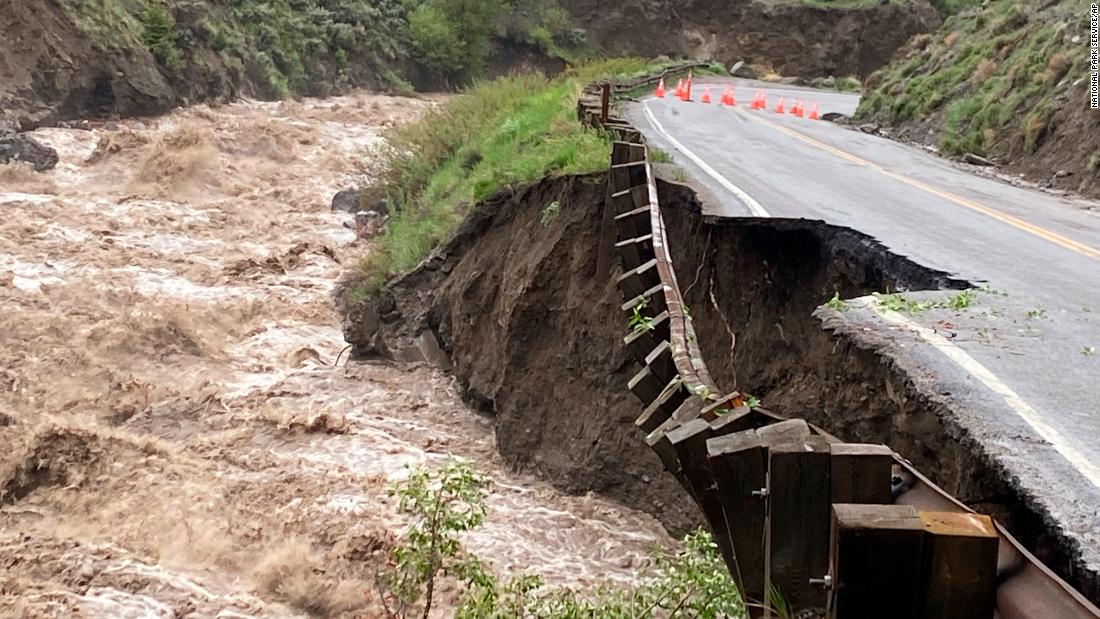The park announced Monday afternoon that all park entrances were closed to visitors, citing “record flooding events” and a forecast of more rain to come.
“Our first priority has been to evacuate the northern section of the park where we have multiple road and bridge failures, mudslides and other issues,” Yellowstone Superintendent Cam Sholly said in a statement Monday.
Immediately north of the Yellowstone, several cities in Montana’s Park County are also experiencing extensive flooding, which has washed out bridges and roads, making it unsafe to travel or impossible to evacuate, Park County officials said on Facebook Monday. Officials have also issued warnings in many areas for residents to avoid drinking local water due to a broken water main and submerged wells.
“The river has never been this high before by my house,” said Elizabeth Aluck, who lives in Gardiner in Park County. Aluck told CNN Monday afternoon that she cannot evacuate because the roads and bridges around her home are washed out.
An Indiana family staying at a short-term rental cabin in Gardiner told CNN they were supposed to leave Monday morning, but the flooding left them stranded.
“The water levels were high on Saturday but within the past 10-12 hours things have gotten rougher,” Parker Manning said. “Our way out of town would be north on 89, but those roads are currently all underwater.”
The Yellowstone River, which runs through the park and several Park County cities, swelled to a record high Monday due to recent heavy rainfall and significant runoff from melting snow in higher elevations, according to CNN meteorologist Brandon Miller.
The Yellowstone River gauge at Corwin Springs, Montana, reached 13.88 feet Monday afternoon, surpassing the historical high crest of 11.5 feet from 1918, NOAA river gauge data shows. “The river is still rising near Livingston, and it is expected to crest between 6 p.m. and 9 p.m. on Monday,” Park County officials said on Facebook.
Across the nation in recent days, extreme weather events have battered communities, including thunderstorms that left nearly 300,000 customers without power in the Midwest, a tornado threat in Chicago, and a severe heat dome which has left more than a third of the US population under heat alerts.
Some are evacuated while others remain trapped
As several roads and bridges are rendered impassable by floodwaters, park and county officials are working to evacuate whoever they can and provide support to those who are unable to leave.
The Park County Sheriff’s Department issued a shelter in place order until 7 a.m. Monday for those south of mile marker 52.5 on US Highway 89 South, the Facebook post said.
The National Guard and local search and rescue teams were assisting with evacuations and rescues throughout the county, including two air lifts and one swift water rescue, the county said.
Multiple communities in Park County are isolated and surrounded by water, including Gardiner, Cooke City and Silver Gate, an update on the county Facebook page said. Quickly rushing floodwaters have also damaged homes, as images show houses either partially or fully collapsing.
In neighboring Carbon County, Montana, flooding compromised utility service lines, leaving many customers in Red Lodge without power, officials said.
Meanwhile, several roads and bridges in Yellowstone have also been compromised by flooding, park officials say. Videos released by the park show portions of paved road washed out or severely eroded.
Due to predictions of higher flood levels and concerns about water and wastewater systems, the park also began moving visitors out of the southern loop of the park Monday, Sholly said.
“We will not know timing of the park’s reopening until flood waters subside and we’re able to assess the damage throughout the park,” Sholly said. “It is likely that the northern loop will be closed for a substantial amount of time.”
Dramatic increase in rain strengthens floodwaters
In June, precipitation across northwestern Wyoming and southern Montana has been more that 400% of the region’s average, according to Miller.
The dramatic increase in rain has been coupled with near-record temperatures in the region that have caused snowmelt in areas of high elevation, the NWS in Riverton, Wyoming, said. Overnight Sunday, the snowmelt made its way into streams and rivers, further adding to the floodwaters, the NWS said.
In addition to the record set at Corwin Springs, the Yellowstone River reached 10.9 feet in Livingston, Montana, Monday exceeding the area’s 1997 record of 10.7 feet, the NWS in Billings, Montana, said.
This article was originally published by Cnn.com. Read the original article here.




